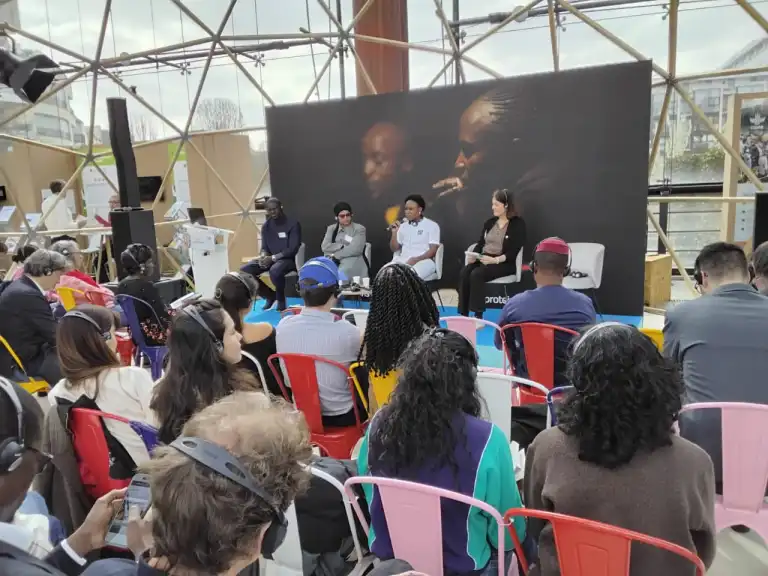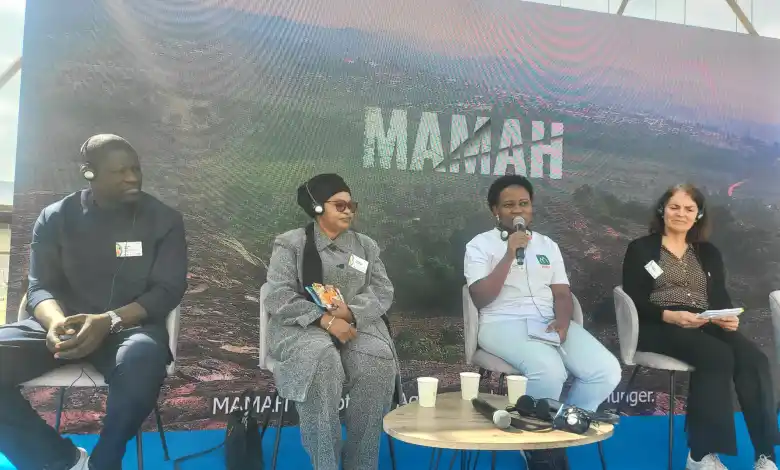Uganda’s MAMAH Showcases Innovation on the use of Edible Insects to address Malnutrition and Hunger at N4G Paris 2025 Summit
MAMAH, a non-governmental organization against malnutrition, is one of 8 organizations worldwide that represented Africa at global nutrition event.
The organization that addresses malnutrition, food insecurity, economic inequalities and systemic gender barriers that hinder vulnerable communities from achieving nutritional and economic well-being, has proudly participated at the Nutrition 4 Growth (N4G) Summit organized by the French Ministry for Europe and Foreign Affairs (MEAE) and FAO(FISH4ACP) from March 26 to 28 in Paris.
The 4th N4G Summit aimed at mobilizing the international community around political and financial commitments to accelerate progress in the fight against malnutrition globally, attracted over 127 delegations including the governments of 106 countries, member states of the UN scaling up Nutrition (SUN), in addition to numerous international organizations, civil society organizations, development banks, philanthropic organizations, research institutions, and businesses who met together to help put an end to this scourge, which hinders countries’ economic and social development and traps communities in an intergenerational cycle of poverty.
While announcing their involvement at the summit, Violet Gwokyalya, Founder and Chief Executive Officer MAMAH Uganda expressed excitement over the summit, saying, “Representing Africa at the nutrition for growth Summit is both an honor and a powerful opportunity to amplify African voices share home-grown solutions and advocate for transformative investments in nutrition.”
MAMAH showcased their innovation on the use of edible insects to address malnutrition and Hunger throughout the 3 days of the summit at the Solutions Village.
Ms. Gwokyalya added, “We presented this innovation to the World and also premiered our documentary film during the special session. Gwokyalya was one of the panel speakers at the session ‘Innovation in the diversification of food systems, an asset for climate and economic resilience’ that explored how innovation in the diversification of food systems can strengthen resilience in the face of climatic, economic and nutritional challenges, by promoting sustainable approaches tailored to the needs of populations.

Gwokyalya highlighted that MAMAH largely aims at improving food and nutrition security and combat gender-based poverty through innovative, sustainable and community-driven interventions and encourage healthier and productive communities in charge of their food and nutrition security, with a special focus on women, girls, children U5, Children in Schools, refugees, and People Living with HIV & AIDS.
MAMAH’s Program Director, Edward Ssebbombo, emphasized that, “Addressing malnutrition through a gender focused lens ensures specific needs and inequalities experienced by women and girls are acknowledged and addressed, leading to more inclusive, effective and lasting solutions to malnutrition.”
It should be noted that way back in 2021, the N4G Tokyo summit mobilized over $27 billion through 396 registered commitments made by 181 stakeholders across 78 countries. N4G Paris is highly anticipated to be another one-of-the-kind opportunity to build on the momentum achieved in Japan and contribute to the Sustainable Development Goals (SDGs) by 2030.
This year, close to US$28 billion in nutrition funding to reach Sustainable Development Goals was announced, attesting to the exceptional degree of mobilization and renewed commitment to multilateralism.
In total, the international community’s financial commitments in support of nutrition represent US$27.55 billion dollars. The Summit Chair’s final declaration helped reaffirm our shared commitment to global nutrition.
Speaking at the summit Thani Mohamed-Soilihi, Minister Delegate for Francophonie and International Partnerships revealed that, “this year’s edition is indeed remarkable as it marks the end of the UN Decade of Action on Nutrition. This summit is a collective success for France and the international community, whose vigorous efforts have demonstrated their commitment to tackling the challenge of malnutrition. That is the strength of multilateralism: the ability to tackle challenges that know no boundaries.”
Thani exclaimed, “Malnutrition has a particularly harmful impact on young children and pregnant and breastfeeding women. We cannot look away when one out of every two children under the age of five dies from malnutrition. Proper nutrition is a challenge shared by all of our societies. It is the key to unlocking a shared, more prosperous future. This summit is not limited to financial investments; it also provides for innovative, effective investments that will have a lasting impact on development.”
Some of the other speakers at the special nutrition innovations sessions included; Claire Mouquet Rivier- Reseach Director at the institute de recherché pour le development (IRD), Khadim Tine, President of RENACVAH Senegal, the National Network of Actors in the Senegalese Oyster Value Chain, Maiimouna Male, Executive Director Laitiere du Sahel (The Sahel Diary).
Over 400 commitments were registered on the Nutrition Accountability Framework platform and France as the N4G Summit host country, committed to continuing its efforts in support of nutrition and, between now and 2030; plans to invest €750 million in projects supported by the French Development Agency in particular, as well as in the Ministry for Europe and Foreign Affairs’ food aid programs. In addition, France has announced that it will be boosting food sustainability education, promoting the prevention and early identification of malnutrition, and improving the nutritional quality of the food supply at the national level.
Running under the theme:


